人教版九年级全册Unit2教学课件(共76张PPT)
文档属性
| 名称 | 人教版九年级全册Unit2教学课件(共76张PPT) | 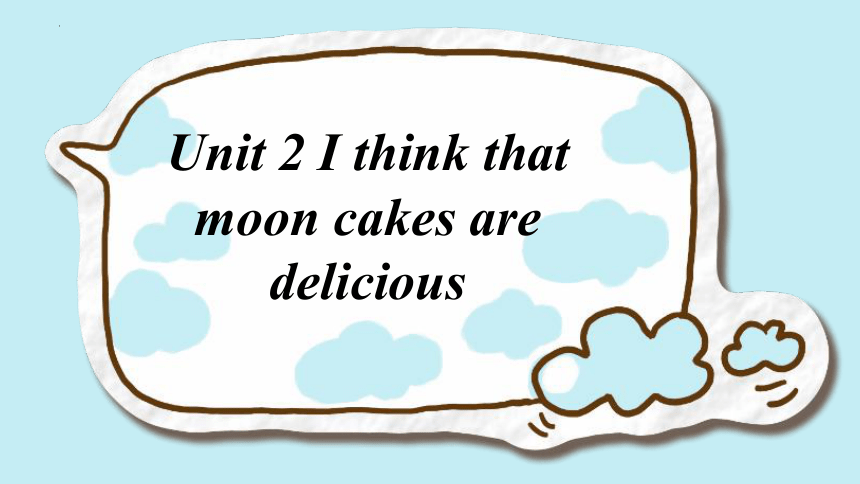 | |
| 格式 | pptx | ||
| 文件大小 | 4.0MB | ||
| 资源类型 | 教案 | ||
| 版本资源 | 人教新目标(Go for it)版 | ||
| 科目 | 英语 | ||
| 更新时间 | 2023-06-06 14:59:44 | ||
图片预览

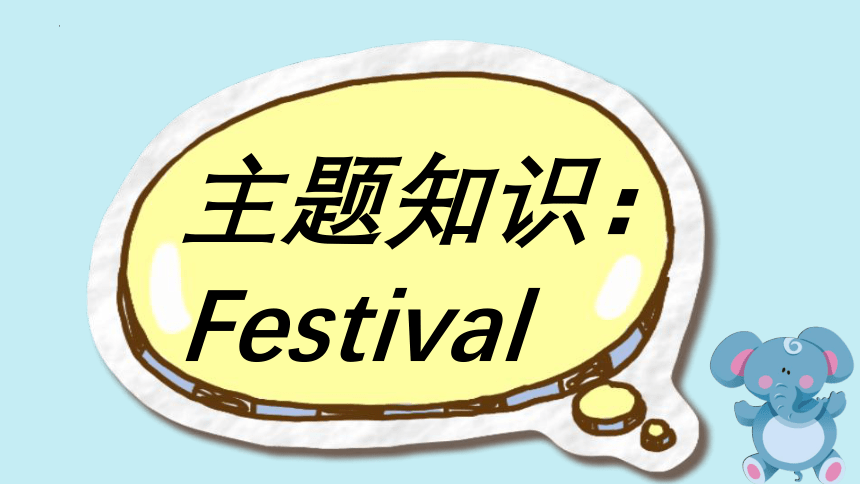
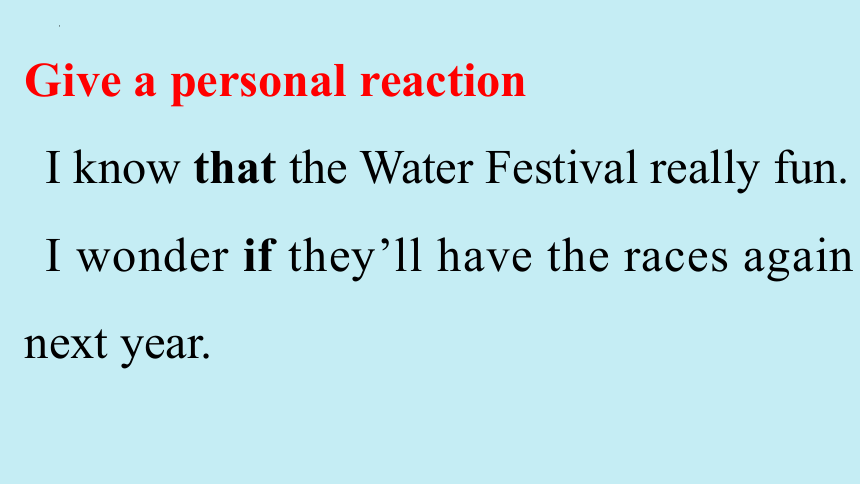
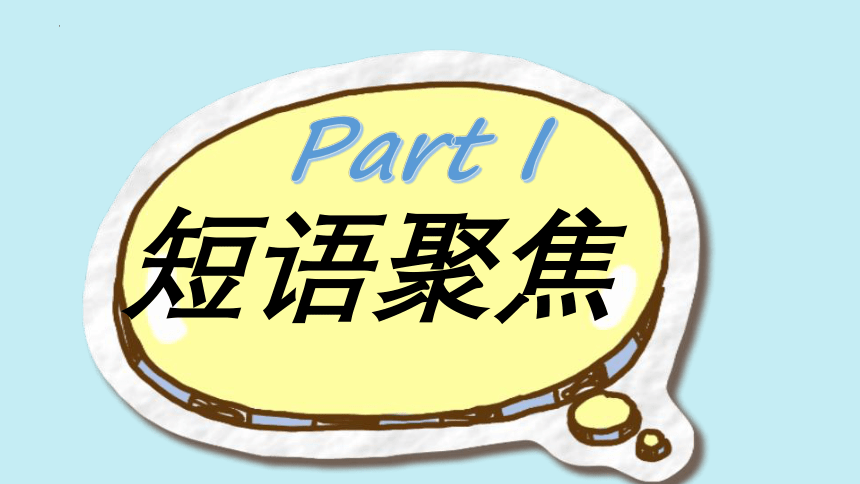
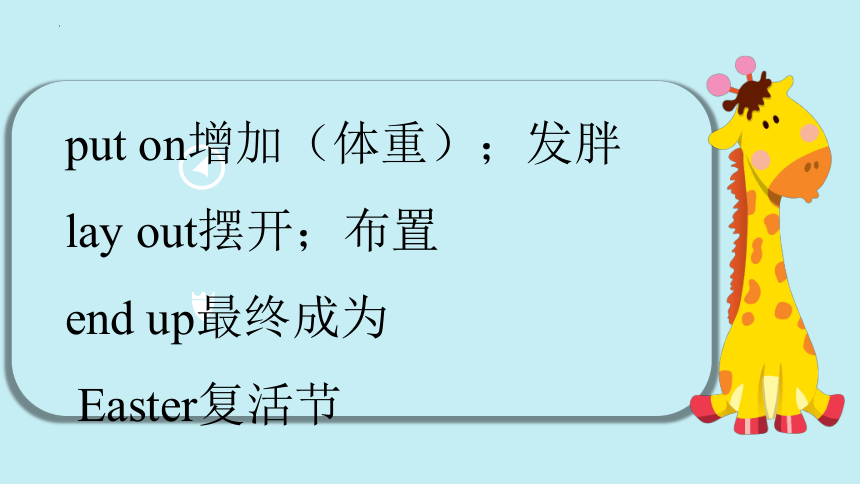
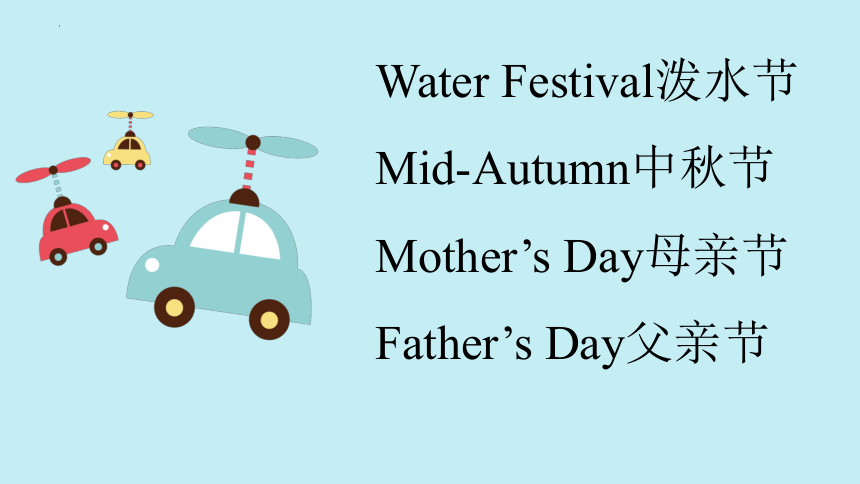
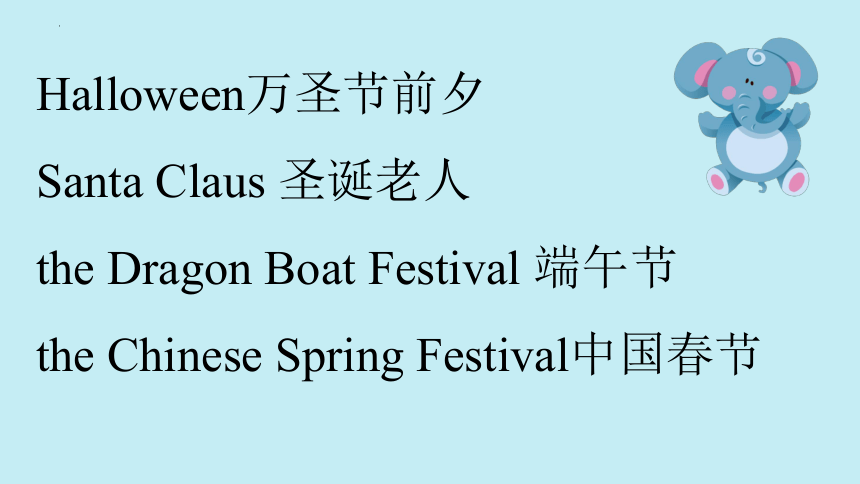
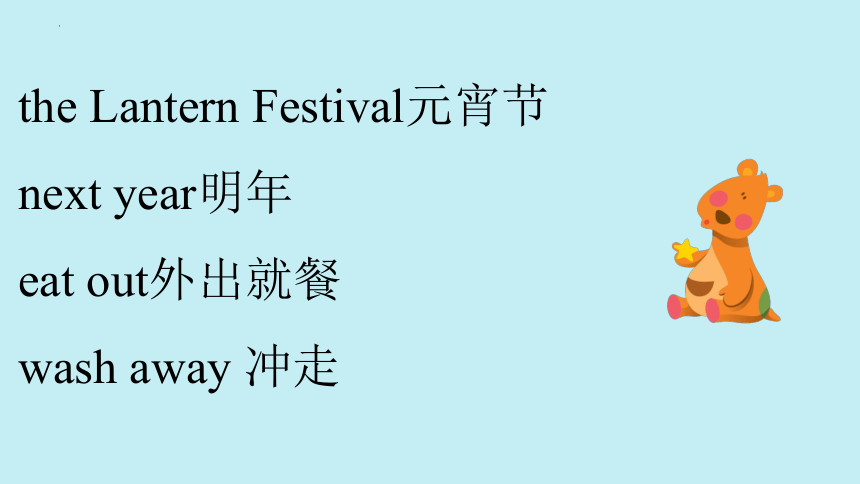
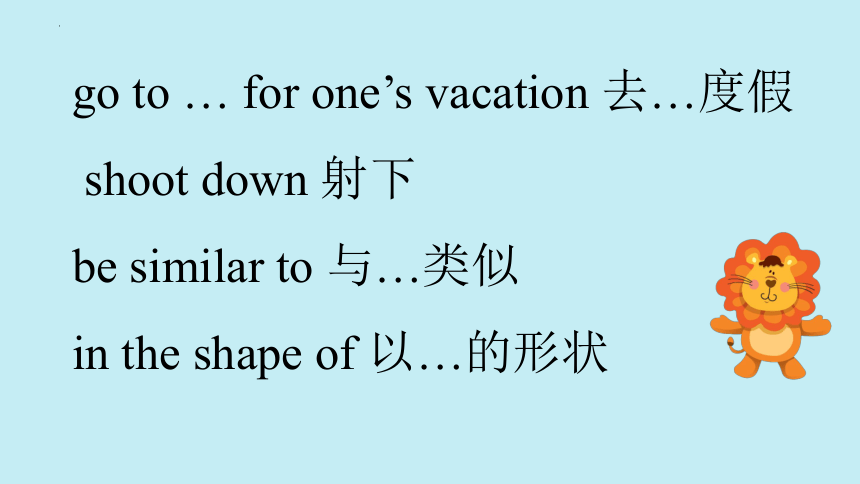
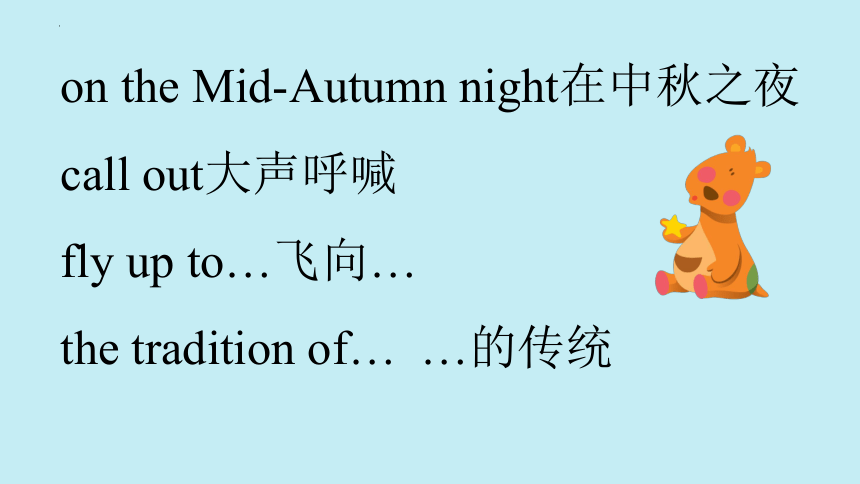
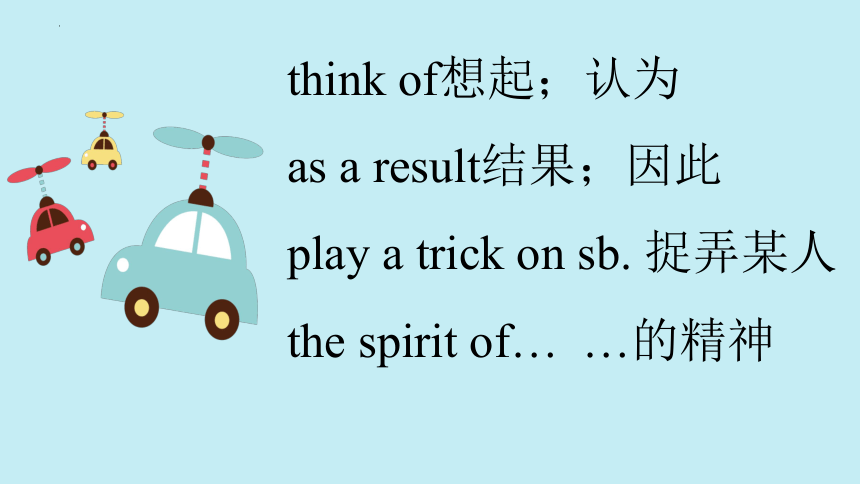
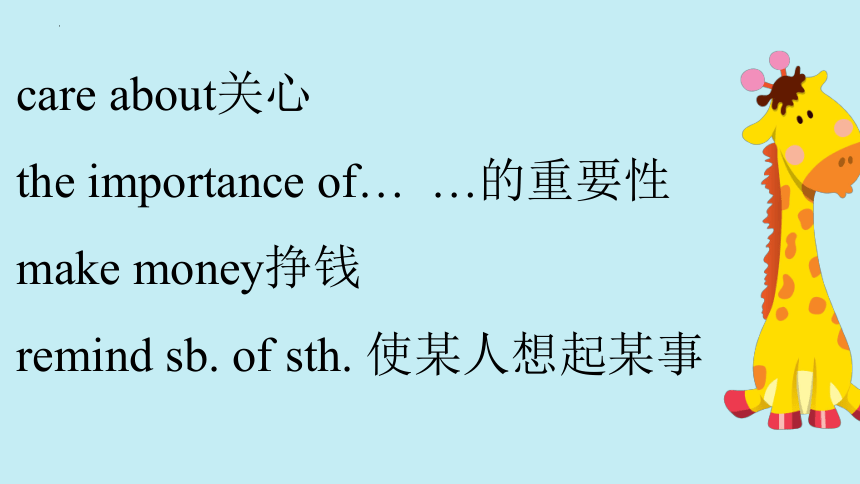
文档简介
(共76张PPT)
Unit 2 I think that moon cakes are delicious
主题知识:
Festival
Give a personal reaction
I know that the Water Festival really fun.
I wonder if they’ll have the races again next year.
短语聚焦
Part I
put on增加(体重);发胖
lay out摆开;布置
end up最终成为
Easter复活节
Water Festival泼水节
Mid-Autumn中秋节
Mother’s Day母亲节
Father’s Day父亲节
Halloween万圣节前夕
Santa Claus 圣诞老人
the Dragon Boat Festival 端午节
the Chinese Spring Festival中国春节
the Lantern Festival元宵节
next year明年
eat out外出就餐
wash away 冲走
go to … for one’s vacation 去…度假
shoot down 射下
be similar to 与…类似
in the shape of 以…的形状
on the Mid-Autumn night在中秋之夜
call out大声呼喊
fly up to…飞向…
the tradition of… …的传统
think of想起;认为
as a result结果;因此
play a trick on sb. 捉弄某人
the spirit of… …的精神
care about关心
the importance of… …的重要性
make money挣钱
remind sb. of sth. 使某人想起某事
wake up醒来
in need 需要帮助
the beginning of… …的开始
used to be 过去是…
between…and… 在…和…之间
give out分发
not only…but also…不但…而且
warn sb. to do sth. 告诫某人做某事
decide to do sth.决定做某事
for centuries数世纪以来
common gifts常见的礼物
treat sb. with warmth 热情对待某人
语法专项
Part II
定义:在复合句中,如果由一个句子充当宾语,这个句子叫作宾语从句。
引导宾语从句的关联词有that, if/ whether, what, who, where, why和how等。本单元主要学习that和if/ whether引导的宾语从句。
什么是宾语从句
定义:在复合句中,如果由一个句子充当宾语,这个句子叫作宾语从句。
引导宾语从句的关联词有that, if/ whether, what, who, where, why和how等。本单元主要学习that和if/ whether引导的宾语从句。
(一). That 引导的宾语从句
1. 关联词
当宾语从句是陈述句时,用that引导,that在口语或非正式文体中常省略。
e.g. :
I think (that) he’ll return in an hour.
The teacher said (that) I was right.
【难点】
关联词that在下列情况下不可省略
(1)当宾语从句的主语是that时,that不可省略。
e.g.He says that that is a map of the city.
(2) 当宾语从句前有插入语时,that不可省略。
e.g. He says, in his letter, that he misses us very much.
(3) 当宾语从句是双宾语中的直接宾语时,that不可省略。
e.g. I can’t tell him that his father died.
(二). if/whether引导的宾语从句
当从句部分是一般疑问句或选择疑问句时,常用if或whether引导宾语从句,if/whether意为“是否”。
e.g. I wonder if/whether he is a driver.
Alice wants to know if/whether she has passed the exam.
【难点】一般情况下,if和whether可互换,在口语中多用if,而在以下几种情况下,只能用whether:
(1) 当or not 直接跟在关联词后时,只能用whether。
e.g. I don’t know whether or not they will come.
(2) 在动词不定式之前只能用whether.
e.g. He doesn’t know whether to go or not.
(3) 在介词后通常用whether。
e.g. It depends on whether I have enough time
【语法专练】
01
I’ve decided to go to London next weekend. I was wondering_____ you could go with me.
A. if B. when C. that D. where
A
Our teacher told us that the earth_____ around the sun.
A. is going B. will go C. went D. goes
02
D
03
My mother asked me if_____ with her.
A. will I go shopping
B. I will go shopping
C. would I go shopping
D. I would go shopping
D
04
______ amazing picture! Who painted it
A. How
B. What
C. How an
D. What an
D
05
________ nervous the girl was! She could not fall asleep all night.
A. What B. What a
C. How D. How a
C
Part III
词汇与讲解
Section A: (教材P11-3a)
1. be crowded with… 意为“挤满…”
e.g. The supermarket is crowed with people.
【拓展】a little too crowded 有点太拥挤
2. wonder 及物动词,意为“想知道”,相当于want to know.
e.g. I wonder who the boy is.(宾语从句)
e.g. I wonder if I can use your smart phone(智能手机).
【翻译】我想知道去哪儿购物。
I wonder where to go shopping
3. whether 连词,意为“是否”,用于表示选择或对某事不确定。
e.g. He wonders whether it will be fine tomorrow. 他想知道明天是否是晴天。
e.g. He asked me whether I needed any help.
4. go to sp. for a/one’s vacation 意为“去…度假”
e.g. He went to Beijing for his vacation.
5. put on+具体数值 意为“增加(体重);发胖”
e.g. I put on five kilograms. 我胖了5公斤!
【拓展】put on weight 长胖
e.g. She can eat what she wants but she never puts on weight.
6. be similar to… 意为“与…相似”。 similar 形容词,没有比较等级!
e.g. His pants are similar to mine.
7. throw… at… 意为“把…抛向/洒向…”
NOTE: throw-threw-thrown
e.g. People throw water at each other on the Water Festival.
8. Chinese people have been celebrating the Mid- Autumn Festival for centuries.
【重点】have been celebrating 是现在完成进行时,其结构是have/has been + doing(现在分词)的形式。
。
现在完成进行时:
表示动作在从过去某一时间开始一直持续到现在,还可能继续下去,强调此期间动作一直在进行。
常与“for+时间段”或“since+时间点”连用。
e.g. I’ve been living in China for five years. 我已经在中国住五年了。(强调五年内一直在中国居住)
OR: I have been living in China since five years ago.
【重点】“for+时间段”提问用how long(多长时间)
--- How long have you been here
--- For half an hour.
0 9
wish 名词,意为“愿望”,常用单数。但意为“祝福或祝愿”时,常用复数。
e.g. My wish is to become a movie star. (单数,愿望)
e.g. Please send my best wishes to your parents. (复数,最美好的祝愿)
10
shoot down 意为“射下;击落”,down是副词。
(shoot-shot-shot)
e.g. He shot down the bird. 他把鸟射了下来。
11
take/have the medicine 意为“吃药”。
e.g. Take the medicine three times a day.
whoever 意为“无论谁;不管什么人”,引导主语从句。e.g. Whoever comes will be welcome. 谁来都会受欢迎。(welcome这里是形容词)
Whoever drank this could live forever. = Anyone who drank this could live forever.
12
13. steal sth. from… 意为“从…偷某物” (steal- stole- stolen)
e.g. He stole some flowers from our garden.
14. refuse to do sth. 意为“拒绝做某事
e.g. He refused to tell us why.
15. call out one’s name 意为“大声呼喊她的名字”
e.g. I called out his name but he turned a deaf ear to me. (置若罔闻)
16. lay out 意为“摆开;布置”
e.g. Can you help her lay out the books on the shelf 你能帮她把书摆到书架上吗?
17. dessert 意为“(饭后)甜点;甜食”,指用餐时的最后一道菜,如蛋糕、冰激凌等。可作可数名词,也可作不可数名词。
e.g. She often eats some ice-cream for dissert.
18. as a result 意为“结果;因此”,单独使用,后面一般用逗号与句子隔开。
e.g. She worked hard. As a result, she passed the exam easily.
19. actually 副词,意为“事实上;实际上”,相当于in fact
Section B
20. dress up 意为“装扮” dress up as… 意为“装扮成…;打扮成…”
e.g. He dressed up as a farmer. 他装扮成了一个农民。
21. mean 动词,意为“意味着…;意思是…”
e.g. What do you mean 你什么意思?
e.g. I mean I can’t come tomorrow.
22. What do you mean by…
e.g. What do you mean by doing that 你那么做什么意思?
23. lie-lay-lain-lying 动词,意为“存在;平躺;处于”
e.g. Here lies the true meaning of Christmas. 这里是圣诞的真谛。
e.g. She lay in bed. 她躺在了床上。
24. This is a novel written by him. “written by him”是过去分词做后置定语,修饰novel.
e.g. The book written by Lu Xun is my favorite.
25. care about 意为“关心;在意”
e.g. He only cared about money.
【辨析】care for 意为“照顾;喜欢”
e.g. He cared for little animals.
26.punish 动词,意为“惩罚” be punished 意为“被惩罚”
e.g. The driver was punished for dangerous driving. 司机因为危险驾驶被惩罚。
27.warn sb. not to do sth. 意为“告诫某人不要做某事”
e.g. His mother warned him not to talk with strangers.
warn sb. about sth. 意为“提醒某人注意某事”
e.g. He warned us about the bad weather. 他提醒我们注意恶劣的天气。
28.end up 意为“最终成为;最后处于”,后面接介词短语、动词-ing形式等。
e.g. Don’t end up like me. 不要最终像我一样。
e.g. If you continue to drink too much wine, you will end up in hospital.
29. be scared (of sth.) 意为“害怕某事”
e.g. He was so scared that he could speak.
e.g. Tom was scared of dogs.
30. wake up 意为“醒来” (wake-woke-waken)
e.g. She woke up at 4 a.m.
31. in need 意为“处于困境中;需要帮助”,介词短语,通常在句中作后置定语。
e.g. He often gives gifts to people in need.
32. not only…but (also)… 意为“不但…而且…”其中also可以省略,用于连接两个相同的句子成分。这个短语适用于就近原则。
e.g. Not only the students but also the teacher likes playing soccer.
【难点】在英语中,为了强调某些内容,常把一些否定词语放在句首,这时句子要使用部分倒装。
e.g. Not only did he go to college, but also he got the scholarship(奖学金).
翻译:她不仅想去美国,她还计划在那里学习。
Not only did she want to go to America, but she planned to study there.
33.give out 意为“分发;散发”
e.g. Please give the books out to the students.
Part IV
话题写作
【话题分析】
本单元的写作任务是介绍某个传统节日。首先要介绍节日的名称及庆祝节日的时间;然后重点介绍人们在节日期间的活动;最后可简单写一下自己的感受。
【写作实例】
假如你是李华,你的美国笔友吉姆对中国传统文化很感兴趣。请你给他写一封电子邮件,介绍一下中国的传统节日——春节。开头和结尾已给出。
Dear Jim,
I’m very glad to tell you something about the Chinese Spring Festival.____________________________
Yours,
Li Hua
【思路点拨】
先总述:春节是一个传统节日及其时间
简要介绍人们在春节前的活动
主要介绍人们在春节期间的活动
Thank you
Unit 2 I think that moon cakes are delicious
主题知识:
Festival
Give a personal reaction
I know that the Water Festival really fun.
I wonder if they’ll have the races again next year.
短语聚焦
Part I
put on增加(体重);发胖
lay out摆开;布置
end up最终成为
Easter复活节
Water Festival泼水节
Mid-Autumn中秋节
Mother’s Day母亲节
Father’s Day父亲节
Halloween万圣节前夕
Santa Claus 圣诞老人
the Dragon Boat Festival 端午节
the Chinese Spring Festival中国春节
the Lantern Festival元宵节
next year明年
eat out外出就餐
wash away 冲走
go to … for one’s vacation 去…度假
shoot down 射下
be similar to 与…类似
in the shape of 以…的形状
on the Mid-Autumn night在中秋之夜
call out大声呼喊
fly up to…飞向…
the tradition of… …的传统
think of想起;认为
as a result结果;因此
play a trick on sb. 捉弄某人
the spirit of… …的精神
care about关心
the importance of… …的重要性
make money挣钱
remind sb. of sth. 使某人想起某事
wake up醒来
in need 需要帮助
the beginning of… …的开始
used to be 过去是…
between…and… 在…和…之间
give out分发
not only…but also…不但…而且
warn sb. to do sth. 告诫某人做某事
decide to do sth.决定做某事
for centuries数世纪以来
common gifts常见的礼物
treat sb. with warmth 热情对待某人
语法专项
Part II
定义:在复合句中,如果由一个句子充当宾语,这个句子叫作宾语从句。
引导宾语从句的关联词有that, if/ whether, what, who, where, why和how等。本单元主要学习that和if/ whether引导的宾语从句。
什么是宾语从句
定义:在复合句中,如果由一个句子充当宾语,这个句子叫作宾语从句。
引导宾语从句的关联词有that, if/ whether, what, who, where, why和how等。本单元主要学习that和if/ whether引导的宾语从句。
(一). That 引导的宾语从句
1. 关联词
当宾语从句是陈述句时,用that引导,that在口语或非正式文体中常省略。
e.g. :
I think (that) he’ll return in an hour.
The teacher said (that) I was right.
【难点】
关联词that在下列情况下不可省略
(1)当宾语从句的主语是that时,that不可省略。
e.g.He says that that is a map of the city.
(2) 当宾语从句前有插入语时,that不可省略。
e.g. He says, in his letter, that he misses us very much.
(3) 当宾语从句是双宾语中的直接宾语时,that不可省略。
e.g. I can’t tell him that his father died.
(二). if/whether引导的宾语从句
当从句部分是一般疑问句或选择疑问句时,常用if或whether引导宾语从句,if/whether意为“是否”。
e.g. I wonder if/whether he is a driver.
Alice wants to know if/whether she has passed the exam.
【难点】一般情况下,if和whether可互换,在口语中多用if,而在以下几种情况下,只能用whether:
(1) 当or not 直接跟在关联词后时,只能用whether。
e.g. I don’t know whether or not they will come.
(2) 在动词不定式之前只能用whether.
e.g. He doesn’t know whether to go or not.
(3) 在介词后通常用whether。
e.g. It depends on whether I have enough time
【语法专练】
01
I’ve decided to go to London next weekend. I was wondering_____ you could go with me.
A. if B. when C. that D. where
A
Our teacher told us that the earth_____ around the sun.
A. is going B. will go C. went D. goes
02
D
03
My mother asked me if_____ with her.
A. will I go shopping
B. I will go shopping
C. would I go shopping
D. I would go shopping
D
04
______ amazing picture! Who painted it
A. How
B. What
C. How an
D. What an
D
05
________ nervous the girl was! She could not fall asleep all night.
A. What B. What a
C. How D. How a
C
Part III
词汇与讲解
Section A: (教材P11-3a)
1. be crowded with… 意为“挤满…”
e.g. The supermarket is crowed with people.
【拓展】a little too crowded 有点太拥挤
2. wonder 及物动词,意为“想知道”,相当于want to know.
e.g. I wonder who the boy is.(宾语从句)
e.g. I wonder if I can use your smart phone(智能手机).
【翻译】我想知道去哪儿购物。
I wonder where to go shopping
3. whether 连词,意为“是否”,用于表示选择或对某事不确定。
e.g. He wonders whether it will be fine tomorrow. 他想知道明天是否是晴天。
e.g. He asked me whether I needed any help.
4. go to sp. for a/one’s vacation 意为“去…度假”
e.g. He went to Beijing for his vacation.
5. put on+具体数值 意为“增加(体重);发胖”
e.g. I put on five kilograms. 我胖了5公斤!
【拓展】put on weight 长胖
e.g. She can eat what she wants but she never puts on weight.
6. be similar to… 意为“与…相似”。 similar 形容词,没有比较等级!
e.g. His pants are similar to mine.
7. throw… at… 意为“把…抛向/洒向…”
NOTE: throw-threw-thrown
e.g. People throw water at each other on the Water Festival.
8. Chinese people have been celebrating the Mid- Autumn Festival for centuries.
【重点】have been celebrating 是现在完成进行时,其结构是have/has been + doing(现在分词)的形式。
。
现在完成进行时:
表示动作在从过去某一时间开始一直持续到现在,还可能继续下去,强调此期间动作一直在进行。
常与“for+时间段”或“since+时间点”连用。
e.g. I’ve been living in China for five years. 我已经在中国住五年了。(强调五年内一直在中国居住)
OR: I have been living in China since five years ago.
【重点】“for+时间段”提问用how long(多长时间)
--- How long have you been here
--- For half an hour.
0 9
wish 名词,意为“愿望”,常用单数。但意为“祝福或祝愿”时,常用复数。
e.g. My wish is to become a movie star. (单数,愿望)
e.g. Please send my best wishes to your parents. (复数,最美好的祝愿)
10
shoot down 意为“射下;击落”,down是副词。
(shoot-shot-shot)
e.g. He shot down the bird. 他把鸟射了下来。
11
take/have the medicine 意为“吃药”。
e.g. Take the medicine three times a day.
whoever 意为“无论谁;不管什么人”,引导主语从句。e.g. Whoever comes will be welcome. 谁来都会受欢迎。(welcome这里是形容词)
Whoever drank this could live forever. = Anyone who drank this could live forever.
12
13. steal sth. from… 意为“从…偷某物” (steal- stole- stolen)
e.g. He stole some flowers from our garden.
14. refuse to do sth. 意为“拒绝做某事
e.g. He refused to tell us why.
15. call out one’s name 意为“大声呼喊她的名字”
e.g. I called out his name but he turned a deaf ear to me. (置若罔闻)
16. lay out 意为“摆开;布置”
e.g. Can you help her lay out the books on the shelf 你能帮她把书摆到书架上吗?
17. dessert 意为“(饭后)甜点;甜食”,指用餐时的最后一道菜,如蛋糕、冰激凌等。可作可数名词,也可作不可数名词。
e.g. She often eats some ice-cream for dissert.
18. as a result 意为“结果;因此”,单独使用,后面一般用逗号与句子隔开。
e.g. She worked hard. As a result, she passed the exam easily.
19. actually 副词,意为“事实上;实际上”,相当于in fact
Section B
20. dress up 意为“装扮” dress up as… 意为“装扮成…;打扮成…”
e.g. He dressed up as a farmer. 他装扮成了一个农民。
21. mean 动词,意为“意味着…;意思是…”
e.g. What do you mean 你什么意思?
e.g. I mean I can’t come tomorrow.
22. What do you mean by…
e.g. What do you mean by doing that 你那么做什么意思?
23. lie-lay-lain-lying 动词,意为“存在;平躺;处于”
e.g. Here lies the true meaning of Christmas. 这里是圣诞的真谛。
e.g. She lay in bed. 她躺在了床上。
24. This is a novel written by him. “written by him”是过去分词做后置定语,修饰novel.
e.g. The book written by Lu Xun is my favorite.
25. care about 意为“关心;在意”
e.g. He only cared about money.
【辨析】care for 意为“照顾;喜欢”
e.g. He cared for little animals.
26.punish 动词,意为“惩罚” be punished 意为“被惩罚”
e.g. The driver was punished for dangerous driving. 司机因为危险驾驶被惩罚。
27.warn sb. not to do sth. 意为“告诫某人不要做某事”
e.g. His mother warned him not to talk with strangers.
warn sb. about sth. 意为“提醒某人注意某事”
e.g. He warned us about the bad weather. 他提醒我们注意恶劣的天气。
28.end up 意为“最终成为;最后处于”,后面接介词短语、动词-ing形式等。
e.g. Don’t end up like me. 不要最终像我一样。
e.g. If you continue to drink too much wine, you will end up in hospital.
29. be scared (of sth.) 意为“害怕某事”
e.g. He was so scared that he could speak.
e.g. Tom was scared of dogs.
30. wake up 意为“醒来” (wake-woke-waken)
e.g. She woke up at 4 a.m.
31. in need 意为“处于困境中;需要帮助”,介词短语,通常在句中作后置定语。
e.g. He often gives gifts to people in need.
32. not only…but (also)… 意为“不但…而且…”其中also可以省略,用于连接两个相同的句子成分。这个短语适用于就近原则。
e.g. Not only the students but also the teacher likes playing soccer.
【难点】在英语中,为了强调某些内容,常把一些否定词语放在句首,这时句子要使用部分倒装。
e.g. Not only did he go to college, but also he got the scholarship(奖学金).
翻译:她不仅想去美国,她还计划在那里学习。
Not only did she want to go to America, but she planned to study there.
33.give out 意为“分发;散发”
e.g. Please give the books out to the students.
Part IV
话题写作
【话题分析】
本单元的写作任务是介绍某个传统节日。首先要介绍节日的名称及庆祝节日的时间;然后重点介绍人们在节日期间的活动;最后可简单写一下自己的感受。
【写作实例】
假如你是李华,你的美国笔友吉姆对中国传统文化很感兴趣。请你给他写一封电子邮件,介绍一下中国的传统节日——春节。开头和结尾已给出。
Dear Jim,
I’m very glad to tell you something about the Chinese Spring Festival.____________________________
Yours,
Li Hua
【思路点拨】
先总述:春节是一个传统节日及其时间
简要介绍人们在春节前的活动
主要介绍人们在春节期间的活动
Thank you
同课章节目录
- Unit 1 How can we become good learners.
- Section A
- Section B
- Unit 2 I think that mooncakes are delicious!
- Section A
- Section B
- Unit 3 Could you please tell me where the restroom
- Section A
- Section B
- Unit 4 I used to be afraid of the dark.
- Section A
- Section B
- Unit 5 What are the shirts made of?
- Section A
- Section B
- Review of Units 1-5
- Unit 6 When was it invented?
- Section A
- Section B
- Unit 7 Teenagers should be allowed to choose their
- Section A
- Section B
- Unit 8 It must belong to Carla.
- Section A
- Section B
- Unit 9 I like music that I can dance to.
- Section A
- Section B
- Unit 10 You're supposed to shake hands.
- Section A
- Section B
- Review of Units 6-10
- Unit 11 Sad movies make me cry.
- Section A
- Section B
- Unit 12 Life is full of the unexpected
- Section A
- Section B
- Unit 13 We're trying to save the earth!
- Section A
- Section B
- Unit 14 I remember meeting all of you in Grade 7.
- Section A
- Section B
- Review of Units 11-14
